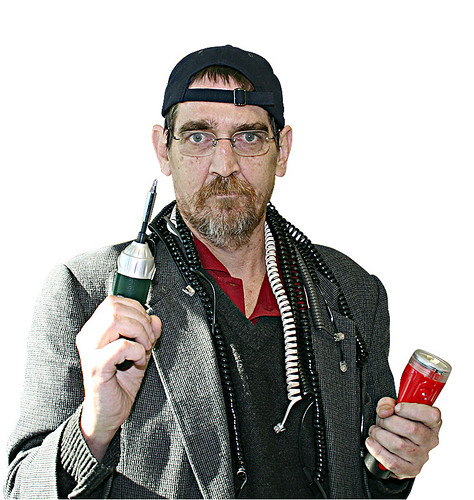OUR CRAFT
Making quick work of controversies
Testy Copy Editnrs has the answers ifonlyevryone elsewould listen.
By Phillip Blanchard
One of the continuing mysteries
of newspapering is why
editors make major productions
out of the simplest things.
Not copy editors, mind you.
We are prone to snap judgments,
true, but those judgments
are usually right. (Sorry
about the "we." I confess I
mean that I am usually right.)
When someone writes on
Testy Copy Editors that "with
all the snowstorms hitting the
northern part of the country,
I've found myself tempted to
use some variant of 'Snow job'
in a headline," we dissuade
him at lightning speed.
When someone writes the
headline "Popping Vitamin
Pills Could Increase Your Risk
of Dying, New Report Sayso"
someone is always ready to
point out: "No, it couldn't."
When the Chinese stock
market tumbles, we know right
away not to write "Markets
Get Shanghaied."
It makes you think that no
one is listening to us.
Here are a few of the continuing
"controversies" dispatched
in the blink of an eye
on TCE:
. The New York Times
writes: "There was some evidence
of pickiness among
women on an online datine
,ll0Tff
BLOG BIO
Testy Copy
Editors
by Phillip
Blanchard
www.
testycopyeditors.org/
Web site, Plentyoffish.com,
where an Anchorage woman
recently posted a message
headlined 'Bye Bye Losers.'
" 'I am a female who knows
what she wants and will stop at
nothing to get what I want,'the
woman wrote. 'That means
what I want I get and I will not
take no for an answer,' "
For all The New York Times
knowso't'Bye Bye Losers" was
posted by a teenage boy in
Omaha. i , ...
We should never quote post-
,, ings to Internet bulletin boards
'because there is no way to
know who wrote them.
Reporters and editors who
work in financial news know,
for example, that various bulletin
boards on which stocks
are discussed are so infected
by penny-stock pushers,
minor-league inside traders
and the like that nothing posted
on them can be taken seriously.
Anonymous criticism is usually
avoided even when we
know who's talking, so why
would we report remarks posted
on a publicly accessible
message board?
This is simple stuff, yet it is
debated every time it comes up
as though each instance is the
first.
. Somewhere in America
today, an editor (not a copy
editor) will get the brilliant
idea of making reporters put
"suggested headlines" atop
their stories. Never mind that
it's been tried at hundreds of
newspapers and proven to be a
time-wasting idea.
That editor will think he's
the first one to think of it, and
put his reporters through the
agony of trying to do something
they're not trained to do,
and his copy editors through
the agony of trying to get the
suggestions sut of their minds _
so-they can write real head-
€
lines.
"Suggested heds" are not
helpful (ust look at AP's "suggestions").
At best they are distractions.
In return for not
offering "suggested heds,"
from me the assigning desk
will get no "suggested stories."
(Some of the lamest story ideas
of all time have come from
copy editors.)
. As if we don't have enough
to do, copy editors sometimes
write columns. It's great if you
happen to be an expert in philately
or numismatics or chess,
but not so great if all you have
to write about is yourself.
We're not very interesting.
TCE has made note of various
columns written by copy
editors that explore, among
other mind-numbing topics,
how we write headlines, what's
on my holiday wish list, why
prisoners at Guantanamo Bay
are gaining weight (based on
no knowledge whatsoever),
how good I look in a bikini,
how sweet it is to watch my
children fall asleep, how men
don't like shopping, what my
child wants to do on vacation,
how my husband and I enforce
bedtime, someone wrote me an
anonymous note about how fat
I am, my New Year resolutions,
I don't have anything to
write about this week, and,so
on.
Some of these columns were
accompanied by photos of
their authors and even, in
extreme cases, photos of their
children.
We know that "I" appears far
too often in news columns, and
that columnists should not
write about their children. The
least we could do is set a sood
example.
Phillip Blanchard is a copy editor
at The Washington Post.
Please can we get along here? We all
can get along."
4. This quote is often tied to the
baseball manager Casey Stengel, but
Keyes notes that the author James
Thurber wrote a Saturday Evening
Post article called "You Could Look lt
Up" in 1941. In Thurber's story Keyes
notes, a baseball manager named
Squawks Magrew also says, "You
could look it uo."
5. OK, we cheated, because you knew
this was said by Woody Allen, who
was born Allen Konigsberg in
Brooklyn. Keyes said President
George H,W. Bush misquoted Allen as
saying "Ninety percent of life is just
showing up,"
Answerc: The Quote Verifier verifies some famous quotes
Gontinued flom Page I
3. Keyes writes that this is a revision of
a quote by Rodney King. After the
protests following the acquittal of four
police officers who were accused of
beating King, a speeding motorist,
King said, as Keyes wrote: "People, I
just want to say, you know, can we all
get along? Can we get along ...
March-April 2007 www.copydesk.org Page 9


